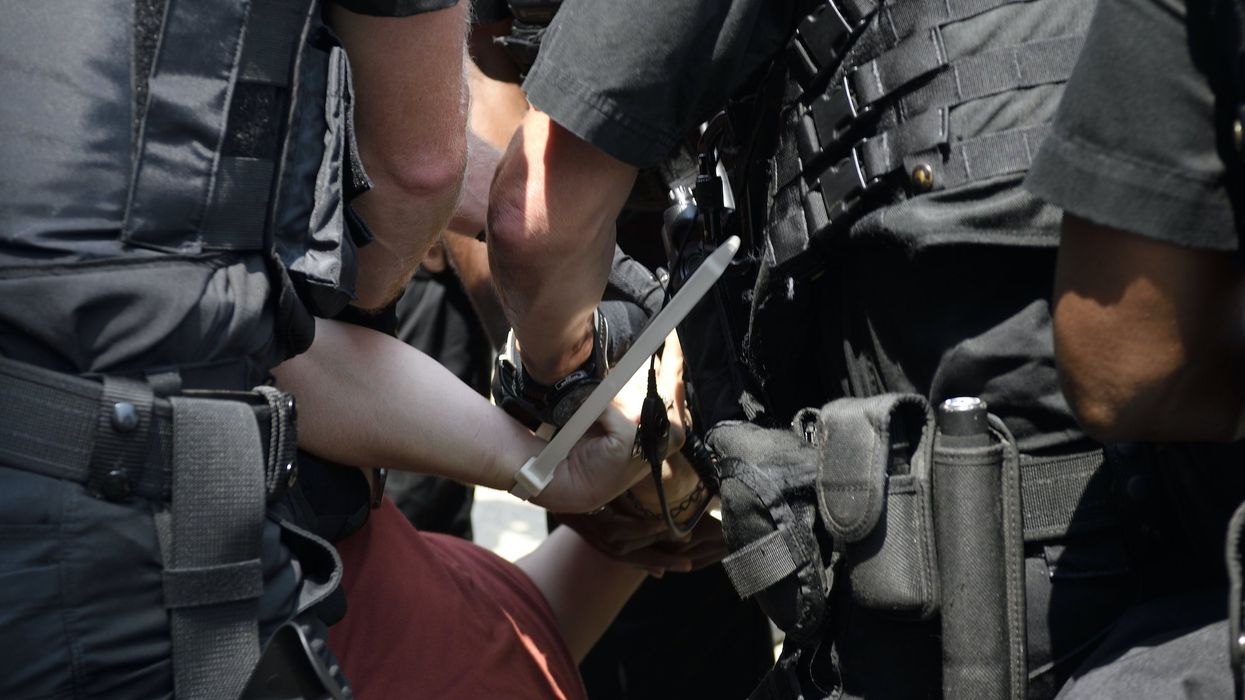
© 2025 Blaze Media LLC. All rights reserved.
PARIS (The Blaze/AP) — Youths have overturned a car and hurled bottles at police in the French city of Lyon amid nationwide tensions over raising the retirement age.
Police are chasing the protesters and trying to subdue the violence with tear gas.
 Months of peaceful protests over the retirement reform have degenerated into violence in scattered sites around France. Lyon saw clashes Wednesday between youths and police, and the violence is resuming Thursday.
Months of peaceful protests over the retirement reform have degenerated into violence in scattered sites around France. Lyon saw clashes Wednesday between youths and police, and the violence is resuming Thursday.
Also Thursday, protesters temporarily blockaded Marseille's airport and have blocked high schools around the country.
Around the country, French protesters blockaded Marseille's airport, truckers tied up highways and Lady Gaga canceled concerts in Paris ahead of a tense Senate vote Thursday on raising the retirement age.A quarter of the nation's gas stations were out of fuel despite President Nicolas Sarkozy's orders to force open depots barricaded by striking workers.
Gasoline shortages and violence on the margins of student protests have heightened the standoff between the government and labor unions who see retirement at 60 as a hard-earned right.
Students barricaded a Paris high school and planned protests nationwide later Thursday, as the Senate wraps up protracted debate on a reform that Sarkozy calls crucial to his presidency.
Student protests have forced the government to its knees in the past, and in recent days some have degenerated into violence. Rioters threw stones at police Wednesday night in the city of Lyon.
The French government — like many heavily indebted governments around Europe — says raising the retirement age and overhauling the money-losing pension system is vital to ensuring that future generations receive any pensions at all.
French unions say the working class is unfairly punished by the pension reform and that the government should find money for the pension system elsewhere. They fear this reform will herald the end of an entire network of welfare benefits that make France an enviable place to work and live.
"We cannot stop now," Jean-Claude Mailly, head of the Workers' Force union, said Thursday of the protest movement.
Unions have held several rounds of one-day strikes in recent months, but scattered actions have turned increasingly radical as the bill heads for near-certain approval in the Senate. Leading labor unions are meeting Thursday to decide what to do next.
In Marseille, hundreds of workers blocked all access to the main airport for about three hours early Thursday. Passengers tugged suitcases along blocked roads as they hiked to the terminal, before police came in and the protesters dispersed.
Leshmi Taguelmint of the CGT trade union, remained determined. "We will continue our action, for the time being we have the whole population behind us and we will continue," he told AP Television News.
Wildcat protests blocked train lines around Paris on Thursday. Protesters in cars and trucks blocked several highways around the country, from near Calais in the north to the Pyrenees in the south, according to the national road traffic center.
Interior Minister Brice Hortefeux lashed out at "certain people who take pieces of our territory for battlefields." Speaking on Europe-1 radio Thursday, Hortefeux said 1,901 people have been detained since early last week.
Hortefeux insisted that the country has several weeks of gasoline reserves and that "the trend is toward improvement" in supplies. Still, he said a quarter of France's gas stations lack fuel.
 Kamal Guerfa works — or at least shows up for work — at a gas station in Lyon. But on Thursday, there was nothing to pump.
Kamal Guerfa works — or at least shows up for work — at a gas station in Lyon. But on Thursday, there was nothing to pump.
"We are here, ready to work, there's no problem with that. The problem is that people come to get gas and there is none. That's the problem," he said.
Laurette Meyer's heart sank when she saw the empty pumps.
"It is penalizing. We work in the building construction business. We have employees who drive all day long in order to build the houses for our customers and it's starting to be very difficult," she said.
Families around the country are on edge over the gasoline shortages because school vacations start Friday.
Authorities, however, are hoping that the vacations cool off student tempers. On Wednesday, hooded youths smashed store windows in the Paris suburb of Nanterre and the city of Lyon, as riot police sprayed tear gas in response.
On Thursday morning, students shut down the Turgot High School near the Place de la Republique in eastern Paris after a student union vote. Teens sat in the middle of the street, barring vehicle traffic. Some sang songs and chanted labor slogans while police guarded the area.
The U.S. Embassy in Paris warned Americans "to avoid demonstrations currently taking place in France." The warning said peaceful demonstrations can escalate into violence, and urges visitors to check with their airlines in case of airport disruptions, and check with rental car agencies about the availability of gasoline.
The Senate vote on the measure is scheduled to come Thursday, but the debate could drag on for another day or two. Opposition Socialists proposed more than 1,000 amendments to the pension reform bill approved by the lower house of parliament last month, and the Senators must debate and vote on each one. As of Thursday morning, they still had more than 200 left.
Finance Minister Christine Lagarde said both the strikes and the violence are taking an economic toll.
They're hitting the entertainment industry, too. Lady Gaga's website says the singer postponed two Paris concerts scheduled for Friday and Saturday "as there is no certainty the trucks can make it" to the show.
In Greece, the BBC reports the country's worst civil unrest in more than 30 years has taken an even more dangerous turn.
 Revolutionary Struggle, a domestic militant group described as "a radical leftist group" in a recent U.S. State Department terrorism report, claimed responsibility for an attack on riot police. That has left at least on officer in critical condition resulting from gun shot wounds.
Revolutionary Struggle, a domestic militant group described as "a radical leftist group" in a recent U.S. State Department terrorism report, claimed responsibility for an attack on riot police. That has left at least on officer in critical condition resulting from gun shot wounds.
Revolutionary Struggle is known for violence. In 2007 it claimed responsibility for a rocket attack on the U..S embassy in Athens. According to the U.S. State Department, and reported by the BBC, the group is responsible for "nine violent terrorist attacks since 2003, including the 2004 murder of a Greek guard outside the British defense attache's residence."
According to the BBC, the trouble in Greek mirrors that of another radical, anti-capitalist group N17:
The big question troubling Greece is whether there is going to be a revival of domestic terrorism along the lines of November 17 (N17), another "populist" left-wing anti-capitalist group, responsible for two dozen assassinations and scores of bomb attacks during a three-decade campaign.The Greek authorities disbanded N17 after Savvas Xeros, a painter and son of an Orthodox priest, was caught in 2002 when the bomb he was planting exploded prematurely.
The involvement of British detectives, following N17's murder of the UK's defence attache, Stephen Saunders, in 2000, also helped the Greek police bring the case to trial.
Fifteen members of N17 were given lengthy jail sentences.
The US state department says the Revolutionary Struggle has "aligned itself with the ideology of N17" and may have incorporated some of its former members.
The Greek riots are in response to austerity measures and the death of 15-year-old Alexis Grigoropoulos, who was killed by police in December of 2008 during a protest.
___
AP Television News reporters Oleg Cetinic in Paris and Jonathan Shenfield in Lyon contributed to this report.
Want to leave a tip?
We answer to you. Help keep our content free of advertisers and big tech censorship by leaving a tip today.
Want to join the conversation?
Already a subscriber?
more stories
Sign up for the Blaze newsletter
By signing up, you agree to our Privacy Policy and Terms of Use, and agree to receive content that may sometimes include advertisements. You may opt out at any time.
Related Content
© 2025 Blaze Media LLC. All rights reserved.
Get the stories that matter most delivered directly to your inbox.
By signing up, you agree to our Privacy Policy and Terms of Use, and agree to receive content that may sometimes include advertisements. You may opt out at any time.





